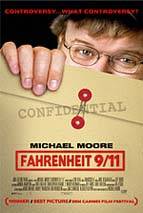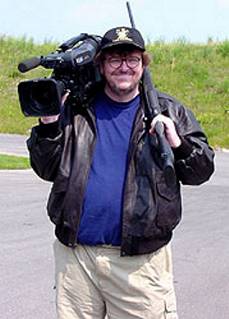Moore was born in Davison, Michigan, just outside Flint, in 1954. His
mother and father were both Irish Catholic, and working class. Both his
father and grandfather worked for General Motors, the largest employer
in the area. Moore attended parochial school until he was 14, and then
attended Davison High School, where he was on the debate team and worked
with the student government.
From Student Activist to School Board Member
Moore often came into conflict with his high school principal over
school rules and resented his authoritarian manner. In 1972, when
18-year-olds were given the right to vote, he ran for and won a seat on
the Flint School Board on the platform of getting that principal fired.
He had become the youngest elected official in the country and nine
months after he took office, the principal was gone.

Moore came into conflict with other members of the school board over his
support for student rights and a teacher's union. He discovered that
administrators were awarding contracts illegally, so he reported them to
the local prosecutor. He successfully sued the school board for the
right to tape-record their meetings. Moore was constantly battling with
the other members of the school board over things like student rights,
school rules and administration that they began holding meetings in
secret without telling him. Moore reported them to the State Attorney
General and they were hauled into court.
When Moore tried to get an elementary school named after slain civil
rights leader Martin Luther King in a district that was 99% white, local
business leaders and the school board started circulating a recall
petition to have him removed. Even though many of the signatures they
collected were declared invalid, a judge allowed the recall election to
proceed. It seemed certain that Moore would be ousted, but a groundswell
of support caused the recall effort to be defeated.
Meanwhile, he briefly attended the University of Michigan-Flint, but
dropped out because he was so busy with legal actions against the school
board and the city of Flint he couldn't concentrate on his studies.
Journalist
He began as a writer for The Flint Voice, an alternative weekly
newspaper and soon became its editor. He expanded the coverage and the
name to The Michigan Voice and served as its editor for 10 years. He
tackled volatile subjects that no other newspaper would touch and that
caught the attention of the publisher of Mother Jones magazine who
offered him the job of managing editor. Mother Jones had once been a
very important voice for the working class, but over time the magazine
had forgotten its roots and was catering to "yuppies" because
that demographic was more attractive to advertisers. Moore was hired to
reshape the content of the magazine to appeal to a more liberal
audience, so that the magazine would be true to its origins and still be
attractive to a desirable demographic.
It wasn't long before he got into a dispute with the publisher over
running a story about the Sandanistas in Nicaragua that he thought was
misleading and unfair to them because it said they were, "Leninist
souvenirs of the New Left" who "had betrayed the promise of
the revolution." Moore was fired and so he filed a two million
dollar lawsuit against the magazine for wrongful termination and
received an out of court settlement.
Documentary Filmmaker
Moore had become disillusioned with mass-market print media, so after
a brief stint working with a Ralph Nader organization, he tried his hand
at documentary filmmaking. His first documentary, Roger and Me was
released in 1989. The title refers to Moore's unsuccessful attempts to
interview Roger Smith, the Chairman of General Motors. The film is about
General Motor's decision to shut down their facilities in Flint, the
main source of employment for its citizens, and how that decision turned
a once-thriving city into an industrial ghost town. The film detailed
how the effects of corporate greed and Republican "trickle-down
economics" had robbed the middle class of its job security and
economic status.

During production, Moore ran out of money and had to sell his house and
hold bingo games in order to raise enough money to complete the film.
His sacrifices paid off though, because Roger and Me went on to be the
most successful documentary of its time.
He followed that up in 1992, with a short film called Pets or Meat: the
Return to Flint, where he went back to Flint to check on many of the
characters that were introduced in Roger and Me. The title refers to a
sign in the driveway of Rhonda Britton, aka the Rabbit Lady, who earned
money by raising rabbits until Flint authorities shut her down. The film
showed that Rhonda and most of the other residents of Flint were
continuing in the downward economic spiral that began with the closing
of the General Motors plant.
In 1994, Moore produced a news-magazine style television show called TV
Nation for NBC. Moore was allowed a lot of freedom by NBC, which
maintained a hands-off policy, but the ratings weren't what NBC had
hoped and the show was in danger of being cancelled when it was picked
up by FOX. Unfortunately FOX executives tried to exert a lot of control
over Moore and the show. After many battles with Moore, the executives
cancelled the show at the end of its second season.
In 1995, Moore produced his first fictional film, a comedy called
Canadian Bacon. The film was about an American president who decides he
can improve his waning popularity by invading Canada. The film's
release was delayed for two years because one of the film's stars,
comedian John Candy died. By the time it was finally released, another
very similar film named Wag the Dog came out shortly thereafter and was
much more popular.
In 1996, Moore published his first book, Downsize This!: Random Threats
from an Unarmed American, a collection of scathing political essays.
Moore decided to film a documentary of his 47-city book tour that was
released in 1997 and called The Big One. During the tour, Moore managed
to get himself banned by the Borders Chain for an incident at the
Borders Bookstore in Philadelphia. Moore didn't want to cross a picket
line of workers who were demonstrating for a union, so he invited the
workers into the store with him and let them speak to the assembled
crowd after he finished. Even though he had gotten the store manager's
permission, Borders executives retaliated by banning him from entering
any Borders outlet.
Moore returned to television with a program called The Awful Truth for
Channel 4 in Great Britain that was very similar in format to TV Nation.
It was eventually picked up by the Bravo network and broadcast in the
US.
Political Activist
In 2000, Moore campaigned for Ralph Nader, promoting his belief that
there was little difference between the two major parties. Nader
didn't have a chance of winning, but to Moore's chagrin, he took
enough votes away from Al Gore to get George W Bush elected.
Moore's next book, Stupid White Men was scheduled for release in the
fall of 2001, but the release was postponed by the publisher because in
the aftermath of the terrorist attacks of September 11, Random House
believed that it was too critical of the president and his
administration. The book was in danger of being cancelled altogether
when an email campaign by librarians saved it. Random House finally
released Stupid White Men in the spring of 2002 and it became a
best-seller.
Liberal Propagandist or Documentary Filmmaker?
After the massacre at Littleton Colorado's Columbine High School in
2002, Moore decided to do a documentary about the causes of the
massacre, which he believed were rooted in America's obsession with
guns and violence. Bowling for Columbine was released in the fall of
2002, and it became the most successful documentary in history as well
as winning the Oscar for Best Documentary.
Moore used his acceptance speech to make a strong statement against the
war in Iraq, that really inflamed his critics. "We live in a time
where we have a man sending us to war for fictitious reasons, whether it
is the fiction of duct tape or the fiction of orange alerts. We are
against this war, Mr. Bush. Shame on you, Mr. Bush . Shame on you. And
any time that you have the Pope and the Dixie Chicks against you, your
time is up."
In an 2004 interview published in Britain's Guardian newspaper, Moore
said, "Since 9/11, the Bush Administration has used that tragic
event as a justification to rip up our Constitution and our civil
liberties. And I honestly believe that…we are inching toward a police
state...At that point, you will find millions of Americans clamoring for
martial law. I'm not talking about a takeover by Bush and his people.
They won't have to fire a shot. The American people will be so freaked
out they will demand that the White House take action, round up anyone
and everyone. That's what I fear. It won't happen with a bang but with
the whimpering sound of a frightened nation."
Fahrenheit 9/11
Moore understood that his support of Ralph Nader during the 2000
presidential election had taken a lot of votes away from Al Gore and was
instrumental in electing George Bush, so during the 2004 election he put
all of his efforts into defeating George Bush. He produced Fahrenheit
9/11, a scathing indictment of the Bush Administration and its
justifications for the war in Iraq to topple Saddam Hussein.

The Disney corporation decided the film was too controversial for them
and they would not allow their Miramax subsidiary to distribute it.
Eventually a distribution deal was completed with IFC and Lion's Gate.
As the June 2004 release date for Fahrenheit 9/11 approached, Bush
supporters mobilized to block theater chains from showing it and tried
to get the Federal Election Commission to prohibit advertising the film
based on campaign finance laws that prohibit third-party advertising for
or against a candidate so close to an election.
Conservatives called him a propagandist and a leftist flamethrower, and
they mounted a substantial effort to discredit him. Right-wing pundits
went on all the talk shows and condemned the film. Talk show host Bill
O'Reilly likened Moore to Nazi propagandist Josef Goebbels. A plethora
of anti-Moore books and films were produced and there are nearly one
million web pages containing the words "Michael Moore" and
either lie or lied or liar.
Despite all their efforts, or perhaps in part because of all the good
and bad publicity, the film made nearly $22 million in its first
weekend, breaking the record previously set by Moore's Bowling for
Columbine. Since its release Fahrenheit 9/11 has become the
highest-grossing documentary of all time.
Moore seems to enjoy his new status as the conservative's favorite
whipping boy, and he can trade shots with the best of them:
"These so-called patriots hold the flag tightly in their grip and,
in a threatening pose, demand that no one ask questions. Those who speak
out find themselves shunned at work, harassed at school, booed off Oscar
stages. The flag has become a muzzle, a piece of cloth stuffed into the
mouths of those who dare ask questions."
SiCKO
Moore's next documentary film, titled SiCKO,
a look at America's malfunctioning health-care system, was released in
June 2007. SiCKO is the single most important film about healthcare ever made in the US and perhaps the rest of the world as well. Moore
illustrates the deaths, injuries, bankruptcies and destroyed lives that the US healthcare system leaves in it's wake and contrasts that with the
healthcare systems in much of rest of the Western world. The US is, after all, the only country in the West that doesn't provide universal
health care.
Moore also shows how the American people have been conditioned by their leaders not to expect decent
healthcare as a basic human right, to reject any discussion of universal healthcare as "Socialized Medicine," and to believe that the
other countries who have universal healthcare; i.e. Canada, the UK, France, etc are much worse off than we are.
Moore illustrates how the entire US healthcare system is run by a few insurance companies who value profits over people, and who dictate
nearly all medical decisions and literally hold the power of life and death over innocent people who have no one to turn to when they are
screwed-over.

America spends more than twice as much per capita on health care as France, and almost two and a half times as much as Britain. And yet it
falls down in almost every key indicator of public health, starting, perhaps, most shockingly, with infant mortality, which is 36 percent
higher than in Britain. Much of the billions of dollars we spend goes to
the doctors, the insurance companies, administrators, the pharmaceutical
industry and other purveyors. And you -- the patient -- are the last to be served.
Moore asks, "How did America come to be like this? We are a good and generous people who are always willing to lend a hand to those in need."
Moore says it should never be all about the money, "It's about how we treat each other in this country, as human beings....and how a system
set up during the Nixon years has turned the United States into a post-apocalyptic nightmare when it comes to health care."
Moore said, "The Americans fear the government, but in France, the government fears the people." You see, we have lived
to long in a state of fear, constantly running from one crisis to the next, never wondering why we have such crises. Or how we could prevent
ourselves from reaching the levels of poverty that we have achieved in what is supposed to be the richest nation EVER.
But the movie doesn't deal only in generalities. It tells stories so horrifying and so pathetic, that it just screams insanity. Like the
story of a mother who lost her toddler due to Kaiser's reluctance to pay
an out-of-network, or the 50somethings who have to move into their daughter's basement after co-pays forced them to sell their house. Or
the man who found a perfect bone marrow donor, but the health group said
the transplant was "experimental". No, it was abundantly clear that
insurance companies are becoming the weak link in our health care delivery, if not the thief in the night. They seek to deny care. That is
their job, not to ensure a healthy population, not to "thrive", but to keep their "medical losses" to a minimum.
Moore shows us an insurance company medical director confessing she had killed people
by intentionally denying treatment coverage to boost company profits. A security camera catching a woman in
dementia dumped on the streets in flimsy hospital gown. A former insurance claim adjustor in
overwhelming remorse. The utter bewilderment, grief and anger of survivors who lost
loved ones to no coverage or coverage reversal.
This is America today. This is how we treat -- not just the least of us -- but all of us, except of course for those who can afford to pay
their own way.
Moore interviewed a guy whose job it was to deny claims after they were already paid.
It goes like this: You have a major operation and the insurance pays for
it. You are very grateful and count your blessings. You think it's all over--but you are wrong because your file has just been sent to some
bean counter whose job it is to try to find anything wrong with the applications you originally filled out when you got the
insurance and any paperwork you have filled out at your doctor's office. If
they find anything that they can use as a pretext to retroactively deny your claims, you'll be billed for the entire cost of the incident;
surgery, hospital stay, drugs, etc.
Moore interviewed a woman who was accused of failing to disclose that she once had a yeast infection many years prior. I
don't remember what operation she had or how much it cost, but the insurance company decided based on
this yeast infection that she had a pre-existing condition and that she should pay for everything they already paid for.
The guy Moore interviewed who told him these things said it was very easy to
find something in someone's file and use it to deny a claim, and save the insurance company the entire cost of whatever health crisis brought
the file to their attention. He even described a legal principle that says that even if you didn't seek treatment for a particular condition,
if you had a symptom that a "reasonable" person would seek treatment for then it could still be considered a pre-existing condition and used
as the basis for throwing out an entire group of claims.
Word to the wise; don't ever leave anything out when filling out medical
forms (well, except for illegal drug use) or it could end up costing you everything you own.
Capitalism: A Love Story
In Capitalism: A Love Story, Michael Moore goes eyeball to eyeball with the entire free-market economy.
"It's a crime story," says Mike. "But it's also a war story about class warfare. And a vampire movie, with the
upper one percent feeding off the rest of us. And, of course, it's also a love story. Only it's about an abusive relationship."
He started shooting about six months before the economy melted down in
2008.
"It's not about an individual, like Roger Smith, or a corporation, or even an issue, like health care," Mike
notes. "This is the big enchilada. This is about the thing that dominates all our lives --
the economy. I made it as if it was going to be the last movie I was allowed to
make. Oh, by the way" Mike says, "it's also a comedy, probably
the saddest one you'll eve see."
Capitalism: A Love Story is now available on DVD. Michael Moore
says, "The fact that Wal-Mart is carrying this movie -- a movie that specifically exposes Wal-Mart's past practice of taking out secret "dead peasant" life insurance policies on its employees and naming itself as the lone beneficiary should the employee meet an "untimely" early death -- well, my friends, need you any further proof that Corporate America is so secure in its position as the ruler of our country, so sure of its infallible power that, yes, they can even sell a movie that attacks them because it poses absolutely no threat to them?"
Moore continues, "I am passionate about this movie. It is not only my most personal film, it is the most vital and necessary film I've made in my 20 years as a filmmaker.
As gloomy as our situation in the world looks these days, I refuse to give up. If there's even the slightest chance that we can turn this around, then I want to help, I want to be part of the fight along with you."
|








